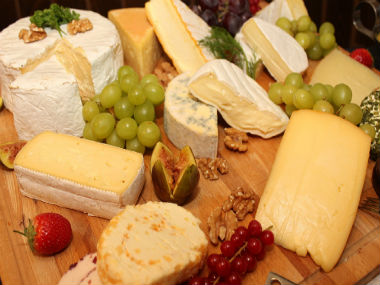Salt brings out the flavour in all food. Sprinkle a bit in chocolate cake, and the result is almost like alchemy. Try to eat your french fries or popcorn without salt, and even the good fatty stuff tastes bland. But too much salt comes with health risks like hypertension. If you love your namkeen, there’s good news for you. Researchers at Penn State University have found that cheese contains natural antioxidants that can minimise the damage to blood vessels from eating too much salt. [caption id=“attachment_7368211” align=“alignleft” width=“380”]  Representational image. Image by HNBS from Pixabay[/caption] “While there’s a big push to reduce dietary sodium, for a lot of people it’s difficult,” lead researcher Billie Alba said in a news release in EurekAlert. “Possibly being able to incorporate more dairy products, like cheese, could be an alternative strategy to reduce cardiovascular risk and improve vessel health without necessarily reducing total sodium,” she added.
Cheesy controversy
The history of cheese goes back many millennia - a few years ago, archaeologists found 3,200-year-old cheese in an Egyptian tomb. Across the world, different cultures have different techniques for pressing milk curds - from soft Turkish cheeses to the Nepalese Churpi, arguably the hardest cheese in the world. In modern times, though, cheese has had a choppy trajectory. Lauded for its high calcium content (good for teeth and bones), it has also been pounded for being fatty. As an irreplaceable ingredient of “junk” food from pizzas to burgers, it’s also a got a reputation for being bad. Plus, we know that some cheese - processed cheese, mostly - also contains “saturated fat”. But does that mean we should we cut it out and put away our cheese boards?
Hearty cheese
To answer this question, let’s look at the nutritional aspects: cheese is a rich source of essential nutrients such as calcium, protein, phosphorus, zinc, vitamin A and vitamin B12.
- Our body needs proteins for muscle growth. Cheese has got it
- For bone growth and strength, we need calcium and vitamin D - most cheeses are fortified with vitamin D
- Even lactose-intolerant people who are allergic to most dairy products can eat some cheeses, especially the aged ones like cheddar, with minimal or no discomfort
- Being a fermented food, cheese contains bacteria and yeast which help to maintain a healthy microbiome in the gut
True, cheese contains certain amounts of saturated fat. But unlike junk food and refined oils, it has loads of health benefits, too. So, consider your medical history. And unless you are obese, have hyperlipidemia, or diabetes, or a medical condition that requires you to cut back on fat - enjoy your favourite cheese in moderation.
New investigation
For their study, the researchers at Penn State selected 11 participants who were negative for salt-sensitive high blood pressure. All of them followed a low-sodium, no-dairy diet; a low-sodium, high-cheese diet; a high-sodium, no-dairy diet; and a high-sodium, high-cheese diet - each diet continued for eight days. At the end of the eighth day for each diet plan, the participants were injected with acetylcholine - a drug that relaxes the blood vessels. How a person’s blood vessels reacted to the drug, told the whole story. The results:
- While only on a high-sodium diet, some blood vessel dysfunction was noticed
- When the same person switched to a high-sodium, high-cheese diet, the participants did not experience any sort of dysfunction
Given that so many people are living with high blood pressure today, this study could have more far-reaching potential than our taste buds. Health articles in Firstpost are written by myUpchar.com, India’s first and biggest resource for verified medical information. At myUpchar, researchers and journalists work with doctors to bring you information on all things health. For information on Cottage Cheese, please read our article here.


)

)
)
)
)
)
)
)
)



